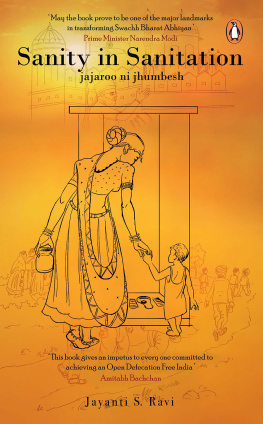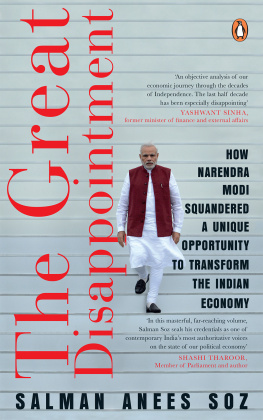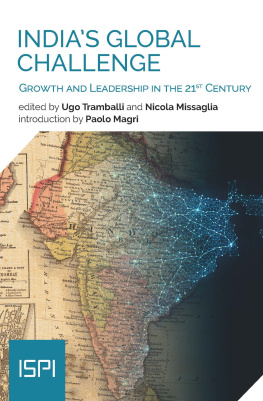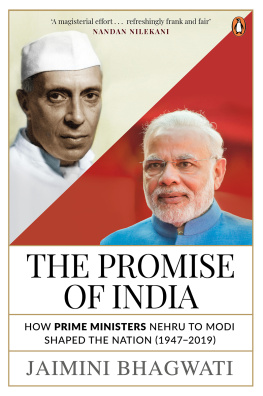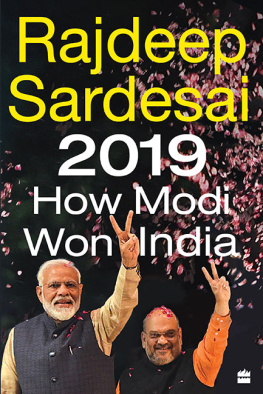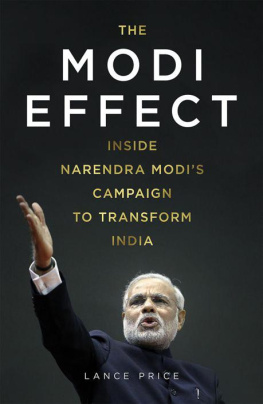
To the people of India and the hundreds of thousands of swachhagrahis who made the revolution possible
Contents
Prime Minister of India

THERE WERE TWO things extremely close to Mahatma Gandhis heart the independence of India, and sanitation. But, given a choice between these two, he said that for him, sanitation was even more important than political independence. India won political independence during his lifetime, on 15 August 1947. But his dream of a Clean India remained unfulfilled even decades after his passing. Rural sanitation coverage, for instance, was still at a mere 38 per cent even in 2014, when our Government first assumed office. This is nearly seven decades since Independence and after three decades of Government-managed sanitation campaigns and programmes. Clearly, something needed to change if we were ever to realize Bapus dream.
When it was time to make my maiden Independence Day address from the ramparts of the Red Fort on 15 August 2014, it was an opportunity to bring to the forefront of public discourse the issue of Swachhata particularly the national shame of open defecation. This was seen as an unprecedented move because few in our country even acknowledged the existence of this problem. The fact that 60 crore Indians still defecated in the open every day pained me, especially the fact that our mothers and sisters had to wait till dark to relieve themselves and be exposed to various diseases.
We cannot solve what we cannot address. So, a key part of that Independence Day address was the announcement of the Swachh Bharat Mission. I asked all Indians if we do not owe it to Mahatma Gandhi for our village, our city, our street, our community, our school, our temple, our hospital, and all areas around us to become free from dirt and filth. We gave ourselves a target of ending open defecation forever and fulfilling Bapus dream of a Swachh Bharat by 2 October 2019, his 150th birth anniversary.
This was never a goal to be achieved as a Government programme only. Swachhata had to be taken up as a collective national responsibility by every citizen of India. If we all came together and joined hands to make it a peoples movement, then there was no reason why we would not be counted among the cleanest nations of the world. This endeavour was beyond politics. We needed to undertake this work motivated by our patriotism and nationalism, free from the influence of politics. This movement was important for the health of the poor, the health of our children, the health of the weakest in our society. And that is what made it a true nationalistic endeavour.
Today, as we stand in the year 2019, it is a matter of pride that the progress made by this Mission has proved that with commitment, even the most impossible-looking task can be made possible if we all work together. It is a true example of the resilience and grit of the people of this country. These last few years, I have had the privilege of meeting and hearing of some incredible and inspiring swachhata warriors from across the country. From Kashmir to Kanyakumari, and Kutch to Kohima, we have all heard stories of swachhata champions who went above and beyond the call of duty to make Swachh Bharat a reality.
Everyone associated with this movement is a swachhagrahi. Swachhagrahis embody the ideas and ideals of Gandhiji and have provided a new momentum, a new energy and a new life to moving from Satyagraha to Swachhagraha. In the future too, whenever anything is written about this movement, the names of Indias swachhagrahis will be taken with reverence, much like that of the freedom fighters of Indias Satyagraha. Just as the satyagrahis led India to political freedom, the swachhagrahis are leading India to freedom from open defecation.
Gram pradhans and sarpanchs have also played a key role in this movement. At the outset of the Mission, pradhans of Ganga bank villages took an oath that they will ensure that the practice of open defecation is ended in all their villages and ensure that the river is not polluted by them. All Ganga bank villages were declared Open Defecation Free almost two years before the rest of the nation!
The media of this country also deserves a special mention. They helped keep the government accountable, mobilized citizens movements, and led local cleanliness-related initiatives out of their own corporate social responsibility. The nation congratulates them for this historic contribution which has proven that the media too can play an active and positive role in meeting the developmental goals of the nation.
This book is a sincere effort to encompass the various aspects of this programme as a peoples movement, as a government scheme, as an economic revolution, as a sanitation revolution. My gratitude to all the authors who have taken time to contribute to this book and helped chronicle this multi-faceted Mission from their perspective.
It is to be reiterated that Bapus dream of a Clean India became achievable only when 130 crore Indians came together and made it happen. I hope this book will show the rest of the world that amazing things can be achieved when people unite for a cause. Indias sanitation revolution will continue to inspire the world to end global open defecation forever.

Union Minister for Jal Shakti, Government of India

THE SWACHH BHARAT Mission is much more than a Government programme, or a sanitation programme. Over the past five years, India has seen a social revolution a movement, of the people, by the people and for the people. The people of India rallied behind the clarion call of their Prime Minister, and collectively changed habits that they had held on to for centuries. This has transformed the sanitation narrative in India and has the potential of doing so throughout the world. It is a fascinating story that must be told.
Several ancient Indian scriptures talk about the importance of sanitation and cleanliness for a healthy body and mind. In fact, the first advanced networked sanitation systems in the world were developed in the Indus valley civilization. Over the years, our focus on sanitation had dwindled, until the day Prime Minister Modi put sanitation back fairly and squarely on the national agenda. And, as they say, the rest is history. From a sanitation coverage base of just 39 per cent in 2014, India is now on the verge of becoming open defecation free. And this transformation has had a significant impact on the lives of our people, especially our mothers, sisters and daughters.
While India has achieved tremendous results on swachhata, we must not and will not rest on our laurels. Sustaining the gains we have achieved will remain a key priority of the Government. And going forward, in the next phase of the Swachh Bharat Mission, we will strive to achieve 100 per cent solid and liquid waste management. Along with this very important goal, we are working towards ensuring piped water supply for all households in India by adopting a similar approach as we did in the Swachh Bharat Mission: making it a jan andolan, a peoples movement.
The Swachh Bharat Mission has been an embodiment of the collective spirit of a nation, showing that with a strong and committed political leadership, public financing, partnerships and most importantly peoples participation in the developmental process, no goal is too difficult to achieve. It has set forth a framework for other large-scale social transformation initiatives in India and the world. This book attempts to capture this fascinating story through the lens of many of its architects.
Next page

